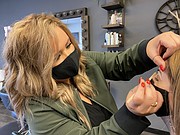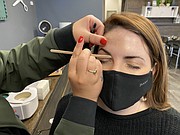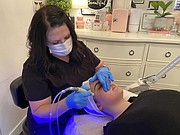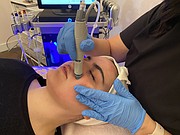How the beauty industry survived a pandemic
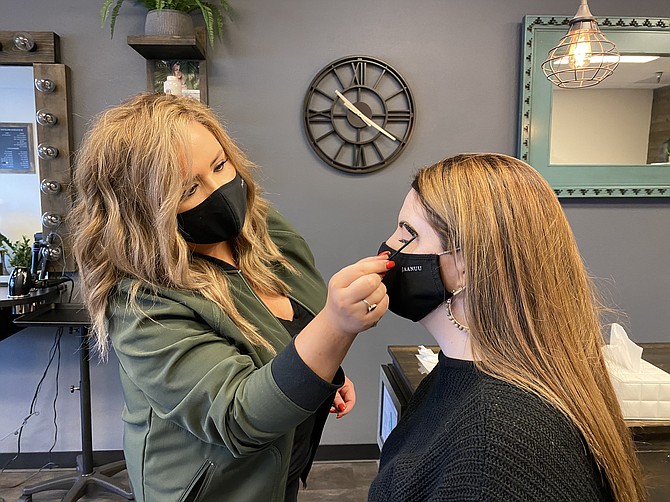
Karissa Mills, owner of Luxe Beauty and Brow Bar on Appleway shapes, tints and waxes eyebrows sometimes 20 times a day.
State-mandated lockdowns inhibited Idahoans from engaging in activities previously a part of their routines, like haircuts and skin or nail care. Small beauty businesses were not considered essential services and became at risk of losing their savings, employees, customers, and stores.
According to the McKinsey & Company 2020 study on the effect of COVID-19 on the beauty industry, researchers found that approximately 30% of the beauty industry was shut down, including the closure of premium beauty-product outlets Ulta, Sephora, and franchises.
"Some of these stores will never open again, and new openings will likely be delayed for at least a year," the study said.
Karissa Mills, owner of Luxe Beauty and Brow Bar on Appleway in Coeur d'Alene, opened her business in March 2015 and serves the community with an array of hair, skin, lash and brow services. Mills has lived in Coeur d'Alene for 25 years, and when the pandemic hit the states, Mills never expected it to affect her business or the community to the extent it has.
"I feel like Coeur d'Alene can be our safe little bubble at times, and it's crazy to be experiencing a pandemic such as this," Mills said. "We are very fortunate to live where we do. Hearing and seeing the effects of COVID nationwide, Coeur d'Alene has it much easier than other areas, that's for sure."
After being forced to completely close their doors for almost two months, from March 26 to May 16, Mills' biggest concern was trying to make ends meet.
"If we can't perform services, we don't have income," she said. "Personal bills don't stop, and business bills don't stop."
Owner of Coco Rose Beauty, Kelli Maxey, actually closed her downtown business a week early after rumors of increasing positive cases worried her for both staff and clients' safety. Maxey opened her salon a year and a half ago with her two daughters' help, previously working at Bling salon in Hayden for eight years.
"We just didn't know how this was affecting people," Maxey said. "Everything we heard was he-said-she-said, and then it turned out to be different. I think we were just all scared and didn't know really what to do, but we wanted to keep everybody safe."
One of Maxey's and her team's most significant challenges was the lack of financial security, heightened by inconsistencies with the Idaho Department of Labor unemployment division.
"I was still expected to pay my lease space, and it was a struggle for some people," Maxey said. "Nobody in our industry was getting unemployment because they didn't know how to work us into the system, and I think most of us ended up getting our unemployment when we were coming back to work."
Both Luxe Beauty and Brow Bar and Coco Rose Beauty are run through a collection of independent subcontractors who rent stations and rooms to run their business. Many of those providers were in the same financial position as Mills and Maxey. Some are the sole providers for their families, Mills said.
"We were told reopening dates that were extended on three different occasions," Mills said. "We would rebook clients in anticipation of being able to reopen, and then we would wait to hear from the governor the day before, and be told we weren't going back yet again."
It was frustrating, not only for the owners and the contractors but the clients. In addition to her regular clients scrambling to set up appointments, Mills saw a new influx from Washington, Montana, Oregon, Texas, and even Florida who were slower to reopen and began overflowing the system. Maxey, on the other hand, was seeing more local customers looking for strict regulations and downtown settings.
Coco Rose Beauty offers various services, ranging from teeth whitening to hydrafacials, nails, hair, and eyelash extensions. As a "touch" industry, Maxey has had to take extra precautions with her salon, including making customers wait in their car until their appointment, removing waiting room furniture, and wearing a plastic screen when doing facials.
"They can't wear a mask, so I have a shield that sits on my shoulders," Maxey said. "We are doing everything we possibly can to keep our clients and staff safe. Since the very get-go, we've required masks, and we make our clients sit out in the car and wait so that we have time to sanitize everything."
The beauty industry has always kept cleanliness, sanitation, and disinfection at the top of the priority list. Service providers must go through testing and licensing in disinfection and sanitation practices before becoming a certified stylist.
"We get randomly inspected and graded on these things," Mills said. "Something I have always prided myself in is the cleanliness of my business."
Luxe Beauty and Brow Bar and Coco Rose Beauty have always had a routine of disinfecting and sanitizing each area and tool between each use. While COVID-19 is a new disease the public is worried about, the beauty industry has had to tackle staph, MRSA, HIV, and HBV for years.
In addition to the regular practices, her salon has added hand sanitizer throughout the storefront and upped the frequency to which they clean common areas like the waiting room, bathroom, door handles, and surfaces.
When doors were closed, the beauty industry adapted through reinforced social media strategies and online product sales. By posting photos of their in-house products, making home deliveries of hair and skincare orders, creating fundraising baskets, and advertising gift card purchases, Mills' salon stayed afloat during much uncertainty.
"We went hard with social media. I felt it was important to keep our presence known. To keep in contact with our clients, to not allow ourselves to be forgotten, so to speak and to have them know we were thinking of them as well," Mills said. "We sold products through social media and made contactless deliveries."
Maxey also was able to stay afloat through curbside pickups, but the lack of interaction with her long-time clients was not only financially concerning but felt like a loss of family.
"It was hard when you're used to being around people all day long. I have up to 10 clients a day. I hear their life stories and then all of a sudden you're home, and you're not socializing with people," Maxey said. "When you do this for so long, it becomes your home because we are here more than you are in your own home, so you get to know these people really on an intimate basis. They become family so when you're gone away from them, it's weird."
Online purchases and at-home salon care became a trend nationally with Americans. However, the sales were not enough to offset the decline of in-store revenue.
According to the McKinsey & Company study, some beauty-product brands and retailers with inventory and shipping capabilities began up-ticking preparations for their e-commerce sales, expecting a boost of almost double usual levels.
"Overall, we think 20% to 30% growth will be more typical," the study reports. "Sephora's U.S. online sales are reportedly up 30% versus 2019, as were Amazon's beauty product sales for the four weeks ending April 11."
Both salons are coming out of the pandemic with plenty of excitement to get back to work. Despite insecurities about the future, they hope it will still be doing what they love, with the clients they appreciate.
"No matter what, women want to feel beautiful and especially during uncertain and scary times, I think it makes people feel better," Maxey said. "We really couldn't be more excited, and neither could our clients."
Information: Luxe Beauty & Brow Bar, 503 W. Appleway Ave. Suite D, Coeur d’Alene, ID, 83814, 208-964-4065; and Coco Rose Beauty LLC, 206 E. Indiana Ave. #118, Coeur d’Alene, ID, 83814; 208-667-0419

